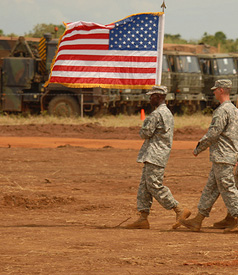When President Obama visited Afghanistan in March, he assured US troops that “the United States of America does not quit once it starts on something.”
But according to Sunday’s New York Times, it ain’t necessarily so. When it comes to combating AIDS in the world’s poorest countries, the greatest nation on earth has apparently decided to cry “Uncle.”
Clinics in Uganda are turning people away, on orders from the US government. A US-run program in Mozambique has been told to stop opening clinics.
Why? According to lying US officials, we don’t have the money to maintain our commitment. Budgets are tight. We had to bail out Wall Street.
But the numbers on offer don’t make any sense. Michel Sidibe, executive director of Unaids, says there is a global shortfall of about $17 billion for controlling the epidemic. The expected US share of such a shortfall would be about a third, or $5.6 billion.
Meanwhile, Congress is about to be asked to fork over $33 billion in our tax dollars for more war in Afghanistan. This $33 billion would only pay for four months of the war, until the end of the fiscal year, when next year’s appropriation will become available.
So, on an annual basis, we’re being asked to spend almost 20 times more on killing in Afghanistan than it is claimed that we don’t have to help stop Africa and Haiti from being decimated by AIDS.
Or, to put it another way: if we could end the war in Afghanistan, then every year we’d save $99 billion compared to the world in which the war continues. We could use $5.6 billion to pay what we owe on controlling the AIDS epidemic and have $93.4 billion left for domestic job creation, tax cuts, going to the beach, whatever ya want.
But it’s not just about the money. It’s also about focus. The stupid, cruel, brutal and pointless war in Afghanistan is sucking up political oxygen that could be used for good – like combating poverty and disease.
And we know how to the end the war. The war will start to wind down as soon as the US agrees to the policy of establishing a timetable for military withdrawal and begins serious negotiations with the senior leadership of Afghanistan’s insurgencies.
Members of Congress could easily do something about this. They could pledge to vote no on $33 billion for more war and they could sign on as co-sponsors to the Feingold-McGovern bill, which would require the president to establish a timetable for military withdrawal. Already, nearly half of the House Democratic Caucus is on the bill.
And President Obama could easily do something about this, too. He could agree to President Karzai’s request that the US should fully back Afghan government peace talks with the Afghan Taliban, as leaders of the US peace movement are calling on Obama to do.
Meanwhile, AIDS treatment advocates are fighting back against the apparent decision of US officials to “cut and run” from the fight against AIDS in Africa. Tonight, activists will confront President Obama and Speaker Pelosi at a $15,000 per person dinner in New York. Many of these activists are the same folks that forced President Clinton and Vice President Gore to get off their hands on treatment for global AIDS in the late 1990s. With public support, they will prevail.
Join us in defending the truth before it’s too late
The future of independent journalism is uncertain, and the consequences of losing it are too grave to ignore. To ensure Truthout remains safe, strong, and free, we need to raise $44,000 in the next 6 days. Every dollar raised goes directly toward the costs of producing news you can trust.
Please give what you can — because by supporting us with a tax-deductible donation, you’re not just preserving a source of news, you’re helping to safeguard what’s left of our democracy.
